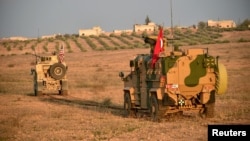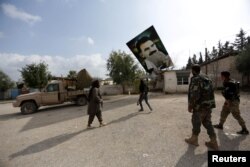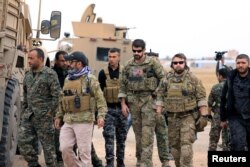Turkish President Recep Tayyip Erdogan is set to meet his U.S. counterpart Donald Trump on the sidelines of World War I commemorations in France. The meeting comes as the two NATO allies seek to reset relations after sustained tensions.
A myriad of policy differences has plunged bilateral relations to record lows, but a Turkish court's release last month of an American pastor, Andrew Brunson, and his return home, appears to have been a turning point.
Washington granted Ankara a six-month waiver on its Iran sanctions, creating further impetus. And Trump also said the murder of Saudi journalist Jamal Khashoggi in Riyadh's Istanbul consulate is resulting in close cooperation with Ankara.
"We are working with Congress, working with Turkey, and working with Saudi Arabia," he said.
Separately, Turkey's neighbor, Syria, is expected to top the talks between the two leaders. U.S. military support of the Syrian Kurdish militia, the YPG, in its war against Islamic State remains an open wound in bilateral ties.
Turkey considers the YPG and its political wing, the PYD, affiliates of the outlawed PKK that has been fighting a decades-long insurgency.
Turkey, the European Union and the U.S. all have designated the PKK as a terrorist organization.
Despite Ankara's intense lobbying for Washington to change its stance toward the YPG and give it the same designation as the PKK, the U.S. appears unmoved.
"We have not designated the YPG as a terrorist organization the way we have the PKK, and we never did," said Ambassador James Jeffrey, the U.S. special representative for Syria engagement.
"We understand Turkey's concerns about its security," he said in a telephone briefing with reporters. "We understand Turkey's concerns about the links between the PYD and the PKK. Thus we're very, very careful in several areas."
In a move widely seen as a gesture to Turkey ahead of the meeting, the U.S. State Department announced a multimillion-dollar bounty on PKK leaders. The step was met with a cool response by Ankara and open derision among pro-government media.
"They are supposedly 'putting a bounty' on terrorist 'leaders,' who are already in their hands, who are their 'staff,' and what's more, whom they use as they please, and are actually mocking us," wrote Tamer Korkmaz of the pro-government newspaper Yeni Safak.
"Very, very late," Turkish Defense Minister Hulusi Akar said in response as he called on Washington to adopt a similar policy toward the YPG.
Turkey was also less than enthusiastic about another U.S. move to enhance trust.
This past week, the U.S. and Turkish militaries carried out a joint patrol around the Syrian city of Manbij. The patrol is part of a road map agreed to in June between the two countries that ultimately will see YPG forces withdraw from the city it helped liberate from Islamic State. Erdogan, however, has repeatedly accused Washington of being slow to implement the deal.
Erdogan is expected to push for expediting the road map and quick withdrawal of all YPG forces from Manbij during talks with Trump.
Experts suggest the Turkish president has an opportunity to achieve a critical objective — the removal of the YPG militia along its border east of the Euphrates River.
"Now in Syria, the strategic priority switches for the U.S. from countering IS to containing Iran," said former senior Turkish diplomat Aydin Selcen, who served in the region. "So Turkey will get the green light to intervene in the eastern Euphrates. They may have already gotten it, or at least a wink."
For the last few weeks, the Turkish military has been pounding YPG bases along its border east of the Euphrates. Washington has expressed "deep concern" at the strikes and deployed U.S. forces to patrol with the YPG in a move to deter such attacks.
"This is not an acceptable thing," Erdogan told reporters Tuesday. "This can cause serious negative developments on the border. I believe Mr. Trump will stop this."
Analysts say Trump will have his own demands.
"Trump will ask Turkey to fall in line against Iran and to hold the ground," said Selcen. "This will push Turkey to distance itself from Russia and Iran altogether."
But Erdogan has also criticized Washington for the reinstatement of sanctions against Iran.
"U.S. sanctions on Iran are wrong," he said Tuesday. "For us, they are steps aimed at unbalancing the world; we don't want to live in an imperialist world."
Turkey's relationship with Iran has deepened over cooperation to end the Syria civil war. Trump is expected to raise the ties with Iran during his talks with Erdogan.






